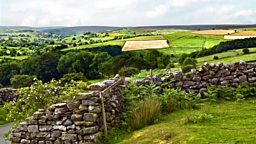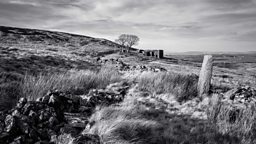Eight things Yorkshire has given the world
Yorkshire, a realm of mountains, moors, coastland, wetland and heath is larger than many member countries of the UN and has a rich and tumultuous past.
In Book of the Week, Richard Morris gives a very personal history of God's Own County in his work ‘Yorkshire’. Here are eight astounding things that the county has given to the world.


1. Yorkshire puddings
Everyone knows that a roast dinner just isn’t the same without a golden brown Yorkshire pudding - crispy on the outside, chewy in the middle, and towering above everything else on the plate.
The Yorkshire pudding was created by cooks in the north of England who wanted to make use of the fat in the dripping pan while their meat roasted. In 1737, a recipe for ‘a dripping pudding’ was published in the book ‘The Whole Duty of a Woman’, with the ‘Yorkshire’ prefix first appearing in a publication ten years later.
To make a Yorkshire pudding, mix half a cup of flour with a third of a cup of water or milk per egg; mix; pour the batter into a hot, oiled pan; bake and devour!
2. Cricket legends
Yorkshire and cricket go together like bat and ball, with the county producing some of the greatest ever cricketers in the history of the game.
Now a pundit, Geoffrey Boycott was a legend with the bat for Yorkshire and England. He played in 108 test matches – scoring 8,114 runs and a phenomenal 22 hundreds for his country. From then to now, and current England Captain Joe Root is another proud Yorkshireman in the process of making cricketing history. Howzat!
3. Stainless steel
Who doesn’t have stainless steel in their home, in the form of a sink, spoon or spatula? The material, which we now use every day, is widely believed to have been discovered in 1913 by Sheffield-born metallurgist Harry Brearley.
Brearley was investigating how to stop the corrosion of metal in gun barrels when he noticed that a 13% Chromium steel had not corroded after several months of exposure. Sheffield later became known as the Steel City because of its international reputation for steel production.



4. The Brontë Sisters
The 19th century writer sisters Charlotte, Emily and Anne hailed from a village called Haworth in Yorkshire. Charlotte was the first to know success (albeit under a male pseudonym) with her novel, ‘Jane Eyre’, and Emily's only novel, ‘Wuthering Heights’ – published the year before she died, aged just 30 – is now considered a masterpiece of literature, as is ‘The Tenant of Wildfell Hall’ by her sister, Anne. The books have been adapted for radio, TV, the silver screen and the stage – and Kate Bush’s musical tribute to Heathcliff and Cathy is a stalwart at most karaoke nights.
The Bronte’s old home at Haworth is now the Brontë Parsonage Museum – visited by thousands of people every year.
5. The first commercial steam train
When we think of the early steam train, it’s George Stephenson’s Rocket that springs to mind. However, the first commercially viable steam locomotive, called Salamanca, was in fact designed and built by manufacturer Matthew Murray in 1812 – in Holbeck, West Yorkshire. The commercially successful train, supplied to a colliery near Leeds, was the first to have twin-cylinders, which was Murray’s innovation.
Why Salamanca? The locomotive was named after the Duke of Wellington's victory at the battle of the same name.

6. Wensleydale cheese
The favourite food of Wallace and Gromit, Wensleydale is a crumbly cheese that has traditionally been made in Wensleydale, North Yorkshire since 1150. The cheese was first made by French Cistercian monks who settled in Wensleydale, bringing with them the know-how for producing cheese from sheep's milk. The monks continued to make the cheese until the dissolution of their monasteries in 1540, at which point local farmers took up the practice. More cheese, Gromit?
Wensleydale cheese has been made in North Yorkshire since 1150.
7. Marks & Spencer
Marks & Spencer started life as a penny bazaar stall on Leeds market. It was opened by an Eastern European refugee called Michael Marks who had a poster next to his stall with the slogan, ‘Don't Ask the Price, It's a Penny.’
In 1894, Marks went into partnership with Thomas Spencer, a former cashier from the wholesale company, Dewhirst, with the running of the business split between Spencer (who managed the office and warehouse) and Marks (who ran the market stalls). Their empire soon expanded and M&S is now a major multinational retailer of clothing, home products and luxury food – with over 1000 stores in the UK alone!
8. The first ever football club
The world’s first ever football club – Sheffield FC – was formed in South Yorkshire on 24 October 1857. The founders, Nathaniel Creswick and William Prest, also pushed through the writing of a commonly accepted set of rules: the ‘Sheffield Rules’. Their innovations include the first crossbar, corner kick, throw-in and the first floodlit match.
The club is the oldest surviving football club to boot, celebrating 160 years in the business of balls.

-
![]()
Book of the Week: Yorkshire
A wide-ranging, lyrical and very personal history of Yorkshire by Richard Morris.
-
![]()
Yorkshire puddings: savoury or sweet?
Jay Rayner and a panel of experts debate this important question in Pontefract, Yorkshire.
-
![]()
A neat new idea: Yorkshire is making whisky
If you think that Yorkshire is a county full of ale drinkers, think again.
-
![]()
Seven things you didn’t know about owls
Fascinating facts to celebrate our favourite nocturnal bird, the wise old owl.




